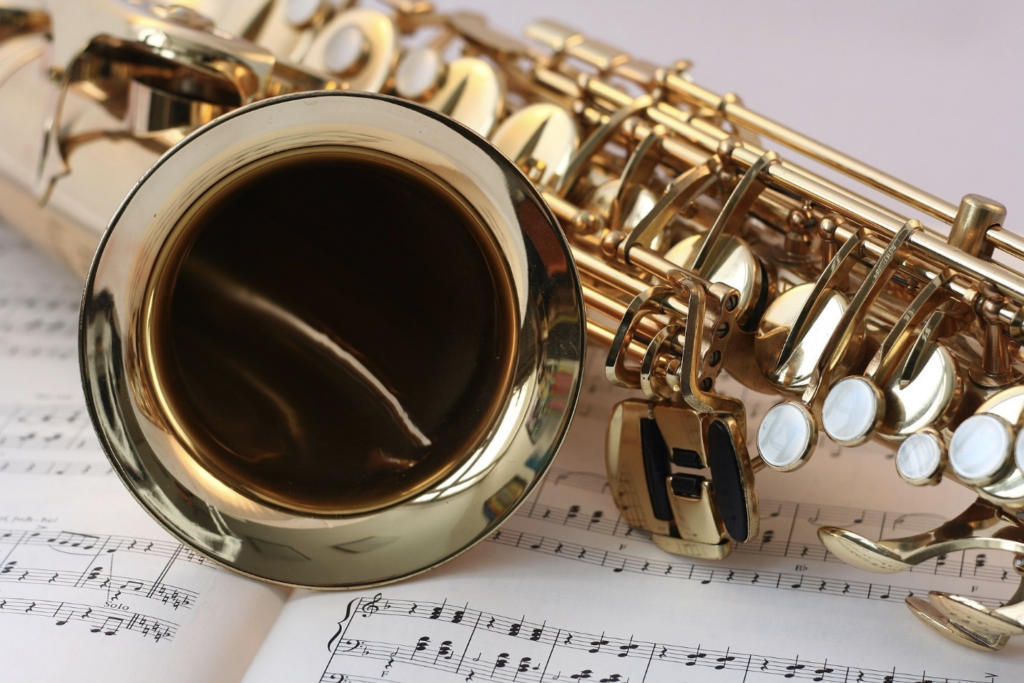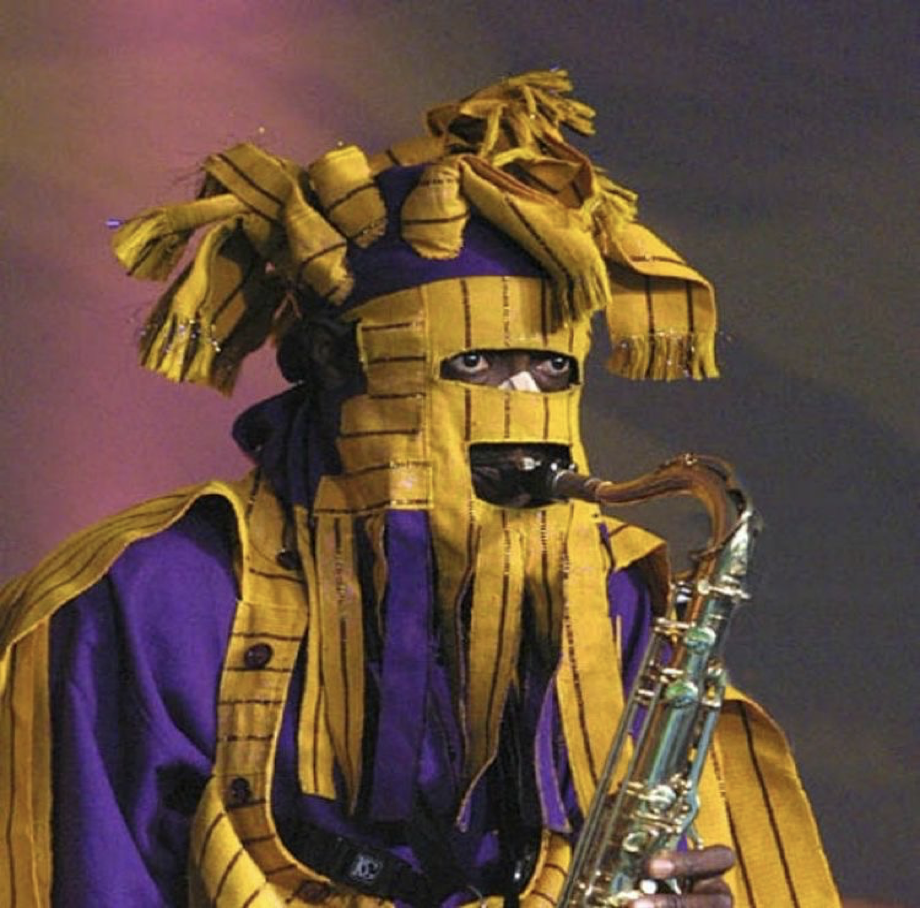In the colourful and dynamic world of Nigerian music, there is one artist who has managed to captivate audiences with his enigmatic persona and spellbinding music – Lagbaja. Known as “the masked one” or “the masked musician,” Lagbaja has become a legendary figure in the music industry adroitly amalgamating Afrobeat, jazz, and traditional Yoruba melodies to craft an unparalleled auditory experience. The resounding impact of his compositions has resonated deeply within the hearts of multitudes, thus etching an enduring imprint upon Nigerian culture and transcending geographical boundaries.
Nigerian vocalist, and afro beat musician Bisade Ologunde was born in Lagos in 1960. widely recognised as Lágbájá due to his distinctive employment of a mask to conceal his identity. His early years and upbringing are largely unknown because he has always aggressively guarded his solitude. Lagbaja rarely shares personal information during interviews, choosing instead to let his music speak for itself. His enduring popularity has been largely fueled by this air of mystery.
As he started his career in the early 1990s, Ologunde used the moniker Lágbájá (which in Yoruba translates to “Jane Doe” or “John Doe”—a person whose name, identity is purposely concealed”). His stage outfit, which included a slitted textile and rubber mask to depict the “common man” corresponding with Yoruba Culture’s carnival tradition, was a reflection of his name. It wonderfully captures the persona that Lagbaja presents: a mute, faceless personality who expresses himself through music. Lagbaja purposefully chose to wear a mask in order to connect with his listeners solely through his musical ability and thoughts, free from prejudices based on physical attributes.

Lagbaja’s preferred instrument, which he self-taught, is the saxophone. After learning the saxophone in 1991, he formed his first simple band in Lagos, Nigeria. The group frequently played at the Sea Garden venue in Lagos. Their music was influenced by Western jazz percussion instruments like the talking drum and congas, which were prominent in their melodies, as well as high life music from the 1960s. Afrobeat, highlife, funk, jazz, and traditional Yoruba sounds and rhythms combine to create Lagbaja’s entrancing musical style. His music is both recognisable and novel because of the way his compositions seamlessly blend modern and historical inspirations. The lively and energising mood of Lagbaja’s presentations is enhanced by the frequent inclusion of a sizeable ensemble of musicians and dancers.
In addition to the captivating melodies and rhythms, the song has a powerful message that speaks to the soul. His lyrics touch on social and political themes that are relevant to both Nigeria and all of Africa. In 1992, he released his debut album, “The Colours Of The Rhythm,” and he continued to make music that was prophetic. But he didn’t really become popular until the release of his double album, “We and Me,” in 2000. This daring work of art took the form of a scathing critique of Nigeria’s political system, fervently promoting transparency and forging popular solidarity. The record attained extraordinary success, capturing the hearts and minds of numerous listeners thanks to Ego Iheanacho’s soulful vocal prowess. Within the poignant verses, Lagbaja fearlessly confronts the perils of corruption, societal inequality, and the spectre of social injustice, becoming an inspiring catalyst for his ardent followers to ardently advocate positive transformation.
Lagbaja’s aura has always been veiled in secrecy throughout his career, yet there have been times when he has let his guard down. One such instance happened in the year 2000 during a live performance at the Africa Shrine in Lagos. Lagbaja made a risky move by momentarily taking off his mask to display his face. The audience was in disbelief, and rumours abounded in the media. A marketing gimmick or a sincere yearning for privacy—which was it? His supporters were divided over the unmasking, with some saying that it undermined the authenticity of his identity. Lagbaja’s fans were left even more fascinated and anxious to learn who the man behind the song was when he swiftly assumed his disguise.
The importance of Lagbaja to Nigerian music cannot be over emphasised. He greatly contributed to the domestic and global spread of Afrobeat, enhancing Nigeria’s status as a global music powerhouse. Numerous modern Nigerian artists still find inspiration in his distinctive tone, and this can be noticed in their work.
In addition his musical impact, Lagbaja has gained recognition and respect for being a socially conscious artist for his commitment to tackling political and social concerns. Lagbaja has become a representative of creative integrity and activism in Nigeria, a nation where musicians are frequently reluctant to make overtly political views.
Lagbaja’s music has grown immensely popular beyond Nigeria notwithstanding the mask that conceals his face. He has developed a wide and committed international fan base as a result of his appearances at renowned music festivals all over the world, such as the Montreux Jazz Festival in Switzerland and WOMAD (World of Music, Arts, and Dance) in the United Kingdom.
The album “Africano… The Mother of Groove” by Lagbaja was nominated for a Grammy Award in the category of Best Contemporary World Music Album in 2005, further solidifying his position as a well-known performer around the world. Despite not winning, his influence on the global music industry was evident just through his nomination.

Lagbaja, like an enigmatic maestro, expertly orchestrates an aura of intrigue through time, retaining the mist of mystery that envelops his entire existence. Despite the public and media’s continuous curiosity, he keeps the secrets close to his heart, like treasured notes waiting for the appropriate moment to resound with the world.
Undaunted by the winds of change, Lagbaja continues to weave melodies that enchant his devoted fans, sporadically releasing new albums that effortlessly enthral and add to his ever-expanding musical legacy. In a day dominated by the light of social media and the constant disclosure of personal lives, his extraordinary ability to evade prying eyes is a remarkable and enviable achievement.
Amidst whispers and conjectures questioning the masked persona’s authenticity, Lagbaja’s resounding truth remains steadfast—the guise serves as a conduit for spotlighting the music’s brilliance and the profound messages they carry. Beyond a mere marketing gimmick, the mask assumes the role of a guardian, shielding the purity of his artistic expressions from undue distraction, thus permitting the essence of his craft to resonate with undiminished potency.
Like a masterful tale of artistry and concealment, Lagbaja’s enigmatic journey unfurls, inviting all who listen to join the enchanting narrative, where the allure of the unknown heightens the allure, and the music reverberates with timeless intensity.
The tale of a musical talent who has broken down borders and connected with audiences in ways that few artists have, Lagbaja, is one of artistic brilliance and enigmatic charm. Along with hiding his identity, his famous mask has come to represent artistic independence and a challenge to the accepted rules in the music business. More than just a lovely song, Lagbaja’s music has a potent message that touches the soul. His lyrics discuss the social and political problems affecting Nigeria and all of Africa. Lagbaja is a true legend of the Nigerian music scene because his supporters are motivated to fight for good change by his message of strength.
The tale of Lagbaja will live on as a symbol of musical inventiveness, social awareness, and the strength of anonymity. One thing is certain: Lagbaja’s music will not fail to inspire and empower generations to come, whether he continues to remain hidden or decides to reveal himself once more. We will continue to embrace the powerful words from one of his songs (Africano- wherever there’s soul in the music, behind it you find the African) as we are reminded of the spirit of Ubuntu.
Sources
- https://en.m.wikipedia.org/wiki/Lagbaja
- https://www.yorubaness.com.ng/2022/07/bisade-ologunde-iconic-story-of-lagbaja.html?m=1
- https://www.allmusic.com/artist/lagbaja-mn0000125482/biography
- https://buzznigeria.com/who-is-lagbaja-and-why-does-he-cover-his-face/
- https://youthvillageng.com/10-things-you-didnt-know-about-lagbaja/




